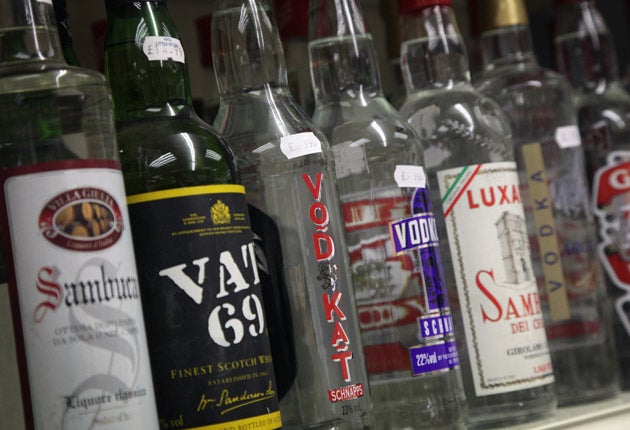Health organisations attack government alcohol pact

Leading health organisations have slammed the Government's "responsibility deal" on alcohol and refused to sign up as partners.
The six organisations, including Alcohol Concern, the British Medical Association and the Royal College of Physicians, accused the Department of Health of allowing the drinks industry to dictate health policy.
Under the deal, the drinks industry would be asked to sign up to a number of alcohol pledges.
These reportedly include ensuring 80% of products on the shelf are labelled for unit content, raising awareness of the unit content of drinks in pubs and clubs and taking action to reduce under-age drinking.
There would also be a pledge to commit to action on advertising and marketing by promoting responsible drinking and keeping alcohol adverts away from schools.
But the six organisations which had been involved in the Government's Responsibility Deal Alcohol Network (RDAN), which also include the British Association for the Study of the Liver, the British Liver Trust, and the Institute of Alcohol Studies, refused to support the deal.
They said the pledges were neither specific nor measurable, that they lacked scope and that there was no evidence such voluntary interventions would be effective.
The statement read: "We have not yet seen evidence that Government is working towards a comprehensive, cross-departmental strategy to reduce alcohol harm, based on evidence of what works, with rigorous evaluation metrics."
The organisations called on the Government to provide:
:: A clear and firm commitment on how it intends - via evidence based policy - to tackle affordability, availability and promotion of alcohol as part of a cross-government strategy;
:: A clear presentation of the steps that will be taken if the current RDA objectives are not met in 12 months' time;
:: A firm commitment to consider change - including through regulation - if voluntary commitments from business are not met after an agreed time period.
Don Shenker, chief executive of Alcohol Concern, said: "This is the worst possible deal for everyone who wants to see alcohol harm reduced.
"There are no firm targets or any sanctions if the drinks industry fails to fulfil its pledges.
"It's all carrot and no stick for the drinks industry and supermarkets.
"By allowing the drinks industry to propose such half-hearted pledges on alcohol with no teeth, this Government has clearly shown that when it comes to public health its first priority is to side with big business and protect private profit."
Dr Vivienne Nathanson, director of professional activities at the BMA, said: "The Government has talked the talk in respect of wanting to tackle alcohol misuse but when it comes to taking tough action that will achieve results, it falls short.
"Instead it has chosen to rely on the alcohol industry to develop policies - given the inherent conflict of interest these will do nothing to reduce the harm caused by alcohol misuse."
Katherine Brown, Head of Research and Communications at the Institute of Alcohol Studies, said: "The most effective means of reducing alcohol-related harm is through adjustments in affordability, availability and promotion.
"These policies are supported by a broad evidence base and have been recommended to Government by a recent cross party House of Commons Health Committee report.
"The Responsibility Deal fails to address any of these policy areas and we are yet to see any real proof that Government is looking into developing a cross-departmental comprehensive alcohol strategy, based on evidence of what works."
Alison Rogers, chief executive of the British Liver Trust, said: "For more than 10 years we have been persuaded to play the long game, sitting and watching the alcohol industry cultivate their relationship with the Government.
"Now it must stop for the sake of the 100 families losing loved ones each week from alcohol-related liver disease."
And Sir Ian Gilmore, the Royal College of Physicians' special adviser on alcohol, said: "The industry pledges published in various newspapers do not give practising doctors, who see the rising tide of health harm from drink in their daily practice, any confidence that they will get to the core of how we reverse this entirely preventable cause of illness and death."
Sir Ian was among a trio of experts who recently warned the Government that up to 250,000 extra lives could be lost in the next 20 years in England and Wales unless tough restrictions on alcohol are introduced.
The liver death rate in the UK is 11.4 per 100,000 people, more than double that of other countries with similar drinking cultures, including Australia and Holland.
Health Secretary Andrew Lansley said: "We have made clear from the start that the responsibility deal is just one strand of the Government's wide public health policy. It explicitly excludes cost and price competition to avoid conflicts of interest.
"The Treasury have already announced an introduction of a new tax on super-strength beers; the Home Office have made their announcement on a ban in sales of alcohol below cost and plans to tighten licensing laws; and, our public health strategy sets out how local areas will be given a ring-fenced public health budget to ensure alcohol misuse gets the priority it deserves.
"In tandem to this action, the responsibility deal is working with the industry on voluntary agreements to get speedier results. For example, to improve unit labelling. The Responsibility Deal has achieved more in the last six months than the previous Government's Coalition for Better Health did in a year and a half. What is more, this is only the first step."
Join our commenting forum
Join thought-provoking conversations, follow other Independent readers and see their replies
Comments